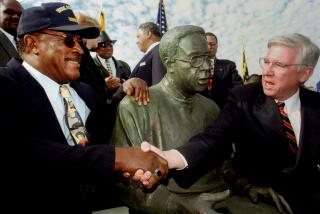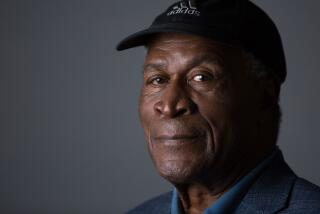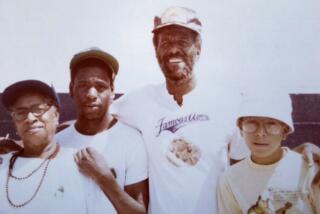Amis Memoirs Leave a Lot to Be Desired : MEMOIRS, <i> by Kingsley Amis,</i> Summit, $25, 346 pages
- Share via
The toady factor plays a big part in most English lives, fictional or real.
The English hero (it is more often the hero than the heroine) has to choose whether to be servile and ingratiating to members of the upper class, or to stand up for himself and risk offending someone powerful.
When he first came on the fiction scene in the 1950s with “Lucky Jim,” Kingsley Amis seemed like Evelyn Waugh with a bracing splash of Angry Young Man thrown in. The history teacher hero of “Lucky Jim” was a bumbling bloke who only thrived when he ceased to grovel and began to risk offending his superiors.
So we approach the Amis “Memoirs” with the expectation that he will be entertaining and irreverent, that this only son of a clerk at Colman’s Mustard can be depended on to be interestingly insolent.
The man is certainly rude. But as well as being irreverent about some famous fellow writers, he is also boorish about some not very celebrated people who made the dangerous mistake of having him over for dinner.
And while he’s too boorish about the nobodies, he’s not boorish enough about the somebodies. To read his gushy description about one of the best-looking women he has ever met, few readers would come up with the name Margaret Thatcher. (“The fact that it is not a sensual or sexy beauty, does not make it a less sexual beauty.”)
You don’t have to be a wonderful person to write a good autobiography, but the old curmudgeon has not done much to mold these memories into a work of art.
The book consists of sketches of famous friends and acquaintances, mixed with impressions of places where he taught. But left out is the thinking that went on as Amis turned out 21 comic novels from the truly funny “Lucky Jim” to the truly skilled “The Old Devils” on through the feminist-baiting “Jake’s Thing.”
In general, Amis sees people as beings he wouldn’t want to get close to: “One does rather go through life constantly suffering from unpreparedness for how awful things are going to be,” he writes, “starting with human nature.”
He can be honestly sympathetic, as in this description of his widowed father’s visit to Wales:
“I stood by helplessly as he tried to construct an independent morning for himself, walking or taking the bus into the centre, buying the Daily Telegraph and doing as much as he could of its crossword in a coffee shop, going to a pub for a single and solitary glass of light ale, then back to the house for lunch, after which he was glaringly at a loose end.”
Amis’ memoirs shocked English readers because he dumped on well-known writers. He recalls J. R. R. Tolkien, the Old English scholar of “Hobbit” fame, as the worst lecturer at Oxford; Lord David Cecil is a close runner-up. The Welsh poet Dylan Thomas, according to Amis, “was an outstandingly unpleasant man, one who cheated and stole from his friends and peed on their carpets.”
Amis reveals that children’s author Roald Dahl once referred to his readers as “little bastards,” and John Cleese isn’t funny and Czechs have bad body odor. It’s a “You’ll Never Have Tea in This Town Again” sort of book.
What’s really shocking is irrelevant meanness. What is the reader to make of this swipe at a Princeton student? “Waiting for me here was a graduate student called Don Schultz, . . . my guide and general helper, dough-faced and inept but willing and efficient enough.”
The stinging put-down of one’s social equal or better, the insult of Churchillian proportions, is not to be found here.
Aside from the pure notes sounded when Amis writes about his father or his two sons or Larkin, and a touching account of hallucinations while in a hospital with a broken leg, there’s more griping and bullying going on in this book than writing.
Next: Jonathan Kirsch reviews “Reflections of an Affirmative Action Baby” by Stephen L. Carter (Basic Books) .
More to Read
Sign up for our Book Club newsletter
Get the latest news, events and more from the Los Angeles Times Book Club, and help us get L.A. reading and talking.
You may occasionally receive promotional content from the Los Angeles Times.










